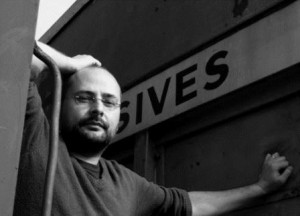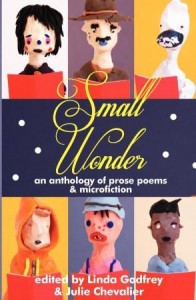 1. What inspired you to write the prose poem/micro-fiction which is published in Small Wonder?
1. What inspired you to write the prose poem/micro-fiction which is published in Small Wonder?
For ‘Light Foxing’, it was a confluence of events and pet likes. I think similar to most people interested in books-as-artefacts, I’m agog for the crumbling, musty hardbacks that line both the shelves of discerning antiquarian bookseller and bargain bins at naive opp shops. My first Australian whiff of foxing came while I was perusing a hoity-toity little ‘shoppe’ in Lorne, Victoria where salty, coastal air meets with brittle pages. And, oh! The foxing that was afoot in many of their volumes was rampant (heavy foxing, you might say). It was there I saw a fully foxed Bible; New Testament even.
I’ve been quite smitten with the term ‘light foxing’ for some time now. And I have always been partial to animals-as-nouns-or-verbs in the English lexicon: quit horsing around; are you fishing for a compliment; well then, you’ll have to pony up another twenty dollars; no, only you can ferret out the truth; go ape shit then. It’s one of my goals to start a new definition for ‘mongoose’, but so far nothing’s worked out for me.
Last year I ran across a brief article on what chemically occurs during the foxing process, why it occurs, how long it takes and in what conditions, etc. The degradation of fibers and chemicals got me thinking about literacy and education. I end the piece with a somewhat unnecessary slam again Wyoming – the least populated US state – for two reasons. First, while Wyoming was the state that wouldn’t get off Teddy Roosevelt’s back to enact Yellowstone National Park (the world’s first so recognised), was the first US state to allow women to vote far before any other and is the current home of Annie Proulx – all very good things – Wyoming also gave the world Dick Cheney and bred the despicable Matthew Shepard affair. Second, ‘Light Foxing’ is prose, but my lines breaks and lengths were calculated. I needed a place name or state that I knew enough about that was exactly 7 characters to fill a space just so. I find odd restrictions like this can occasionally help make a good poem.
2. Tell us about that process. (Do you start sparse and widen out, or do you write down every possible association and cut back? Do you research the subject matter you are writing about? Is it pure intuition?) Take us through an example if you want.
For this poem I did a bit of research, although nary an iota compared to what Proulx does for her novels and stories. This piece arrived relatively in-tact. Not sure how my obsession with trains winnowed its way into the words, but it fit the long and winding chemical process and the topography of Wyoming. If Wyoming, jagged chunk of land that it is, was a book, it’d be a Steinbeck tome with all the characters transmogrified into natural elements like trees, petrified trees, water sheds, feral weeds and native wolverines. Perhaps Of Mice and Men with nary a mouse nor man to be found amongst the pages, only the slow jujitsu of boulders, their glaciers and the grassy plains which once was an over-written description of a haircut.
Many of the poems I write are offshoots of something I am fussing over … fussing over to death. As I’ve said in other interviews, I call them ‘host’ poems. The ‘parasite’ poems that a host poem begets (which can be numerous) are typically my better efforts. ‘Light Foxing’ was absolutely a parasite poem. Oddly, I cannot even recall what catastrophe of letters was its primordial Jacuzzi.
3. What advice do you have for other writers ? about the first or last line? About how to choose the title? Do you follow any rules?
I don’t have a set of rules, but I advise any new writer to read Richard Hugo’s The Triggering Town. It’s a collection of essays, largely centralised around the theme of his teaching creative writing for so many years, an occupation that he was quite renowned for. These are essays, distinctly not hokey how-to trumpetings.
I’m big on titles. Mine are generally ‘of’ and ‘about’ the poem that follows, but I try to put some thought or twist in them to accentuate or clue-in a reader on what’s coming next. I find they can be helpful preambles.
My only skerrick of advice – as I don’t feel to rest on any plinth with height enough for offering – is this: If you run across an event in your day that strikes you as one that you definitely must mine for a poem sometime, some day … it’s usually going to be rubbish. That and don’t force things out, expecting that which you are forcing to be genius. Writing exercises are great. They work. They can keep you sharp. Not always, but they can.
Six years ago I was on a tram in Melbourne, snaking through the CBD on Bourke Street. We stopped outside what was then Gaslight Records. There, kneeling on the kerb, crouched a corpulent man wearing a smock. His bald pate glistened. He had five one-litre bottles of Paul’s brand milk set out in front of him on the footpath like ten-pin bowling pins, each bottle equidistant from the others in a row of quintuplets. All the labels were facing the same way, outward. During the tram’s pause, I watched him unscrew the cap off the first bottle and slowly dribble its contents entirety over his head, the milk’s viscous jacket zipping all over his contours. Without flinching, he then reached for the second bottle and reenacted the cycle.
Methodically, fluidly, silently. Almost robotically? Yes.
The now-drenched man was reaching out for the third bottle as my tram pulled away. Nobody on the early week-day morning footpath seemed to notice; only me and another chap on the tram. We looked at each other in silent stupefaction. Occasionally, I wonder if what I’m telling you now actually happened … or if it was that a total stranger and I were locked inside somebody’s errant fetish or feral hallucination that simply escaped them like a cap in wind. But, I swear it’s true. And I thought that that event was one I would for sure write about. I never have. And won’t. It doesn’t need it and I know better now.
4. Who or what inspires your writing?
My inspirations, if you can call them that, come via triggers (a term I freely co-opt from Hugo mentioned above). Mine are various inputs, oftentimes sound. The noise of cash register in a supermarket has triggered a poem. Listening to the album Z-Nation by Melbourne indie band Gaslight Radio, in conjunction with reading a book on population statistics, sewn together with a glass of tempranillo, catalyzed a poem in me about shipwrecks that eventually wound up in Best Australian Poetry 2009. There are occasions where I am reading – typically hefty ‘collecteds’ by O’Hara, Thom Gunn or Forbes as examples – where I am moved to jot some things down. I’d say my inspirations are fleeting.
5. Tell us what do you do if you haven’t written anything in a while and you want to get started writing again? Could you share your favourite writing exercise with our readers?
Lately I have been shoehorning my jumpstarts into exercises with ever more stringent forms than the previous major effort. Most recently, I’ve had a go at producing a series of pantoums that also incorporate a rhyming pattern of quatrains. This is reasonably preposterous … but it has netted a few poems I rather like, some taken for publication.
